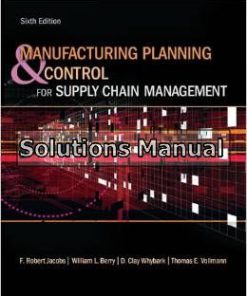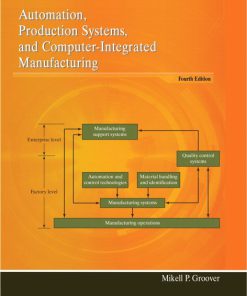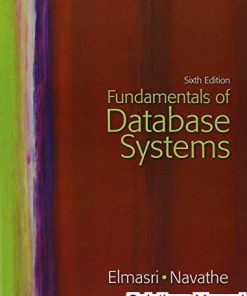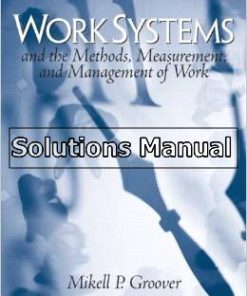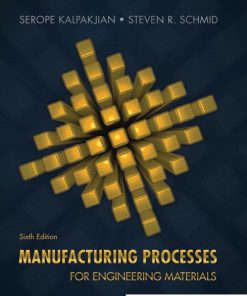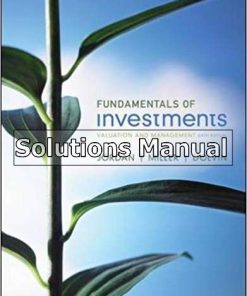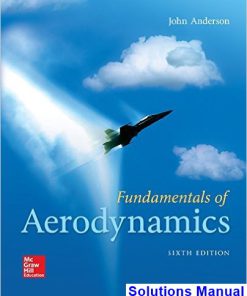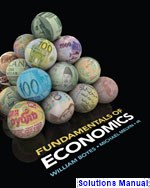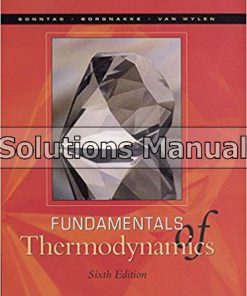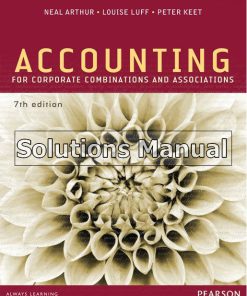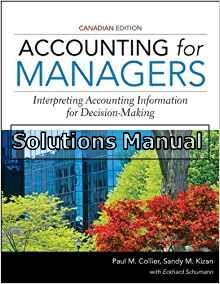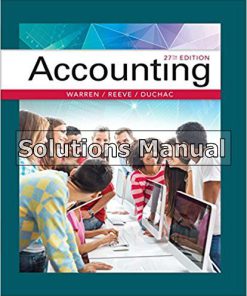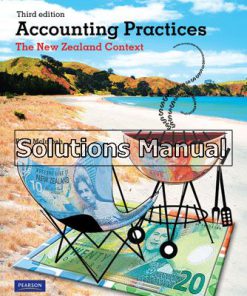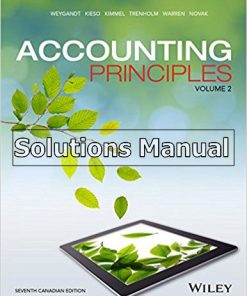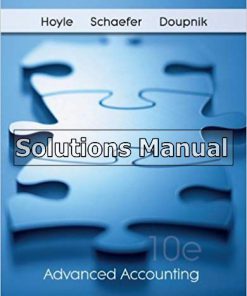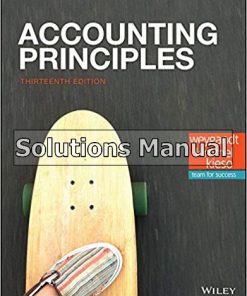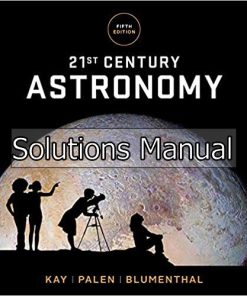Fundamentals of Modern Manufacturing 6th Edition Groover Solutions Manual
$50.00 Original price was: $50.00.$26.50Current price is: $26.50.
Fundamentals of Modern Manufacturing 6th Edition Groover Solutions Manual.
This is completed downloadable of Fundamentals of Modern Manufacturing 6th Edition Groover Solutions Manual
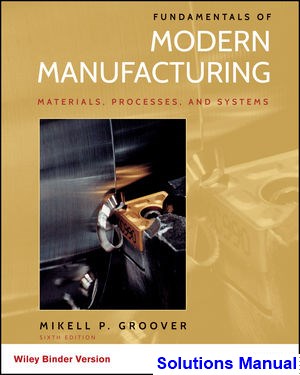
Product Details:
- ISBN-10 : 9781119128694
- ISBN-13 : 978-1119128694
- Author: Mikell P. Groover
Fundamentals of Modern Manufacturing: Materials, Processes, and Systems, 6th Edition, is designed for a first course or two-course sequence in Manufacturing at the junior level in Mechanical, Industrial, and Manufacturing Engineering curricula. As in preceding editions, the author’s objective is to provide a treatment of manufacturing that is modern and quantitative. The book’s modern approach is based on balanced coverage of the basic engineering materials, the inclusion of recently developed manufacturing processes and comprehensive coverage of electronics manufacturing technologies. The quantitative focus of the text is displayed in its emphasis on manufacturing science and its greater use of mathematical models and quantitative end-of-chapter problems. This text is an unbound, three hole punched version.
Table of Content:
1 Introduction and Overview of Manufacturing 1
1.1 What Is Manufacturing? 2
1.2 Materials in Manufacturing 6
1.3 Manufacturing Processes 9
1.4 Production Systems 14
1.5 Manufacturing Economics 17
Part I Material Properties and Product Attributes 26
2 The Nature of Materials 26
2.1 Atomic Structure and the Elements 26
2.2 Bonding between Atoms and Molecules 29
2.3 Crystalline Structures 31
2.4 Noncrystalline (Amorphous) Structures 36
2.5 Engineering Materials 37
3 Mechanical Properties of Materials 40
3.1 Stress–Strain Relationships 40
3.2 Hardness 53
3.3 Effect of Temperature on Properties 57
3.4 Fluid Properties 59
3.5 Viscoelastic Behavior of Polymers 61
4 Physical Properties of Materials 66
4.1 Volumetric and Melting Properties 66
4.2 Thermal Properties 69
4.3 Mass Diffusion 70
4.4 Electrical Properties 72
4.5 Electrochemical Processes 74
5 Dimensions, Surfaces, and Their Measurement 77
5.1 Dimensions, Tolerances, and Related Attributes 77
5.2 Conventional Measuring Instruments and Gages 78
5.3 Surfaces 85
5.4 Measurement of Surfaces 89
5.5 Effect of Manufacturing Processes 91
Part II Engineering Materials 94
6 Metals 94
6.1 Alloys and Phase Diagrams 95
6.2 Ferrous Metals 99
6.3 Nonferrous Metals 115
6.4 Superalloys 123
7 Ceramics 126
7.1 Structure and Properties of Ceramics 127
7.2 Traditional Ceramics 129
7.3 New Ceramics 131
7.4 Glass 133
7.5 Some Important Elements Related to Ceramics 136
8 Polymers 140
8.1 Fundamentals of Polymer Science and Technology 141
8.2 Thermoplastic Polymers 150
8.3 Thermosetting Polymers 155
8.4 Elastomers 158
8.5 Polymer Recycling and Biodegradability 162
9 Composite Materials 166
9.1 Technology and Classification of Composite Materials 167
9.2 Metal Matrix Composites 174
9.3 Ceramic Matrix Composites 176
9.4 Polymer Matrix Composites 177
Part III Solidification Processes 181
10 Fundamentals of Metal Casting 181
10.1 Overview of Casting Technology 182
10.2 Heating and Pouring 184
10.3 Solidification and Cooling 188
11 Metal Casting Processes 198
11.1 Sand Casting 198
11.2 Other Expendable-Mold Casting Processes 202
11.3 Permanent-Mold Casting Processes 207
11.4 Foundry Practice 215
11.5 Casting Quality 219
11.6 Castability and Casting Economics 221
11.7 Product Design Considerations 225
12 Glassworking 230
12.1 Raw Materials Preparation and Melting 230
12.2 Shaping Processes in Glassworking 231
12.3 Heat Treatment and Finishing 236
12.4 Product Design Considerations 237
13 Shaping Processes for Plastics 239
13.1 Properties of Polymer Melts 240
13.2 Extrusion 242
13.3 Production of Sheet and Film 251
13.4 Fiber and Filament Production (Spinning) 254
13.5 Coating Processes 255
13.6 Injection Molding 256
13.7 Compression and Transfer Molding 266
13.8 Blow Molding and Rotational Molding 268
13.9 Thermoforming 273
13.10 Casting 277
13.11 Polymer Foam Processing and Forming 278
13.12 Product Design Considerations 279
14 Processing of Polymer Matrix Composites and Rubber 285
14.1 Overview of PMC Processing 285
14.2 Open Mold Processes 289
14.3 Closed Mold Processes 293
14.4 Other PMC Shaping Processes 295
14.5 Rubber Processing and Shaping 299
14.6 Manufacture of Tires and Other Rubber Products 304
Part IV Particulate Processing of Metals and Ceramics 309
15 Powder Metallurgy 309
15.1 Characterization of Engineering Powders 310
15.2 Production of Metallic Powders 314
15.3 Conventional Pressing and Sintering 316
15.4 Alternative Pressing and Sintering Techniques 322
15.5 Materials and Products for Powder Metallurgy 325
15.6 Design Considerations in Powder Metallurgy 326
16 Processing of Ceramics and Cermets 331
16.1 Processing of Traditional Ceramics 331
16.2 Processing of New Ceramics 339
16.3 Processing of Cermets 341
16.4 Product Design Considerations 443
Part V Metal Forming and Sheet Metalworking 345
17 Fundamentals of Metal Forming 345
17.1 Overview of Metal Forming 345
17.2 Material Behavior in Metal Forming 348
17.3 Temperature in Metal Forming 349
17.4 Strain Rate Sensitivity 351
17.5 Friction and Lubrication in Metal Forming 353
18 Bulk Deformation Processes in Metal Working 356
18.1 Rolling 356
18.3 Forging 365
18.5 Extrusion 380
18.6 Wire and Bar Drawing 390
19 Sheet Metalworking 401
19.1 Cutting Operations 401
19.2 Bending Operations 408
19.3 Drawing 412
19.4 Dies and Presses for Sheet-Metal Processes 419
19.5 Other Sheet-Metal-Forming Operations 425
19.6 Sheet-Metal Operations Not Performed on Presses 428
19.7 Bending of Tube Stock 433
Part VI Material Removal Processes 439
20 Theory of Metal Machining 439
20.1 Overview of Machining Technology 441
20.2 Theory of Chip Formation in Metal Machining 444
20.3 Force Relationships and the Merchant Equation 448
20.4 Power and Energy Relationships in Machining 453
20.5 Cutting Temperature 455
21 Machining Operations and Machine Tools 459
21.1 Machining and Part Geometry 459
21.2 Turning and Related Operations 462
21.3 Drilling and Related Operations 470
21.4 Milling 475
21.5 Machining Centers and Turning Centers 482
21.6 Other Machining Operations 484
21.7 Machining Operations for Special Geometries 489
21.8 High-Speed Machining 495
22 Cutting-Tool Technology 500
22.1 Tool Life 500
22.2 Tool Materials 506
22.3 Tool Geometry 513
22.4 Cutting Fluids 523
23 Economic and Product Design Considerations in Machining 529
23.1 Machinability 529
23.2 Tolerances and Surface Finish 530
23.3 Machining Economics 535
23.4 Product Design Considerations in Machining 541
24 Grinding and Other Abrasive Processes 546
24.1 Grinding 546
24.2 Related Abrasive Processes 562
25 Nontraditional Machining and Thermal Cutting Processes 568
25.1 Mechanical Energy Processes 569
25.2 Electrochemical Machining Processes 572
25.3 Thermal Energy Processes 576
25.4 Chemical Machining 585
25.5 Application Considerations 590
Part VII Property Enhancing and Surface Processing Operations 595
26 Heat Treatment of Metals 595
26.1 Annealing 595
26.2 Martensite Formation in Steel 596
26.3 Precipitation Hardening 600
26.4 Surface Hardening 601
26.5 Heat Treatment Methods and Facilities 602
27 Surface Processing Operations 606
27.1 Industrial Cleaning Processes 606
27.2 Diffusion and Ion Implantation 610
27.3 Plating and Related Processes 611
27.4 Conversion Coating 615
27.5 Vapor Deposition Processes 616
27.6 Organic Coatings 622
27.7 Porcelain Enameling and Other Ceramic Coatings 624
27.8 Thermal and Mechanical Coating Processes 625
Part VIII Joining and Assembly Processes 628
28 Fundamentals of Welding 628
28.1 Overview of Welding Technology 629
28.2 The Weld Joint 631
28.3 Physics of Welding 634
28.4 Features of a Fusion-Welded Joint 637
29 Welding Processes 641
29.1 Arc Welding 641
29.2 Resistance Welding 650
29.3 Oxyfuel Gas Welding 657
29.4 Other Fusion-Welding Processes 661
29.5 Solid-State Welding 663
29.6 Weld Quality 669
29.7 Weldability and Welding Economics 673
29.8 Design Considerations in Welding 676
30 Brazing, Soldering, and Adhesive Bonding 681
30.1 Brazing 681
30.2 Soldering 686
30.3 Adhesive Bonding 690
31 Mechanical Assembly 697
31.1 Threaded Fasteners 697
31.2 Rivets and Eyelets 704
31.3 Assembly Methods Based on Interference Fits 705
31.4 Other Mechanical Fastening Methods 708
31.5 Molding Inserts and Integral Fasteners 709
31.6 Design for Assembly 710
Part IX Special Processing and Assembly Technologies 716
32 Rapid Prototyping and Additive Manufacturing 716
32.1 Fundamentals of Rapid Prototyping and Additive Manufacturing 717
32.2 Additive Manufacturing Processes 719
32.3 Cycle Time and Cost Analysis 726
32.4 Additive Manufacturing Applications 730
33 Processing of Integrated Circuits 734
33.1 Overview of IC Processing 735
33.2 Silicon Processing 738
33.3 Lithography 743
33.4 Layer Processes Used in IC Fabrication 747
33.5 Integrating the Fabrication Steps 753
33.6 IC Packaging 755
33.7 Yields in IC Processing 759
34 Electronics Assembly and Packaging 764
34.1 Electronics Packaging 764
34.2 Printed Circuit Boards 766
34.3 Printed Circuit Board Assembly 773
34.4 Electrical Connector Technology 780
35 Microfabrication Technologies 785
35.1 Microsystem Products 785
35.2 Microfabrication Processes 788
36 Nanofabrication Technologies 797
36.1 Nanotechnology Products and Applications 797
36.2 Introduction to Nanoscience 801
36.3 Nanofabrication Processes 805
Part X Manufacturing Systems 812
37 Automation Technologies for Manufacturing Systems 812
37.1 Automation Fundamentals 812
37.2 Hardware for Automation 815
37.3 Computer Numerical Control 819
37.4 Industrial Robotics 830
38 Integrated Manufacturing
38.1 Material Handling 838
38.2 Fundamentals of Production Lines 839
38.3 Manual Assembly Lines 841
38.4 Automated Production Lines 845
38.5 Cellular Manufacturing 849
38.6 Flexible Manufacturing Systems 853
38.7 Computer Integrated Manufacturing 857
Part XI Manufacturing Support Systems 861
39 Process Planning and Production Control 861
39.1 Process Planning 862
39.2 Other Manufacturing Engineering Functions 869
39.3 Production Planning and Control 872
39.4 Just-In-Time Delivery Systems 879
39.5 Lean Production 882
40 Quality Control and Inspection 887
40.1 Product Quality 887
40.2 Process Capability and Tolerances 888
40.3 Statistical Process Control 890
40.4 Quality Programs in Manufacturing 894
40.5 Inspection Principles 898
40.6 Modern Inspection Technologies 900
Appendix: Answers to Selected Problems 909
Index 913
People Also Search:
fundamentals of modern manufacturing groover
fundamentals of modern manufacturing 6th edition groover
fundamentals of modern manufacturing
fundamentals of modern manufacturing 6th edition
fundamentals of modern manufacturing 6th edition download scribd
fundamentals of modern manufacturing 6th edition solution manual download pdf
groover fundamentals of modern manufacturing
Instant download after Payment is complete
You may also like…
Solutions Manual
Manufacturing Planning and Control for Supply Chain Management 6th Edition Jacobs Solutions Manual
Engineering
Solutions Manual
Work Systems The Methods Measurement and Management of Work 1st Edition Groover Solutions Manual
Engineering
Manufacturing Processes for Engineering Materials 6th Edition Kalpakjian Solutions Manual
Solutions Manual
Fundamentals of Investments 6th Edition Jordan Solutions Manual
Solutions Manual
Fundamentals of Thermodynamics 6th Edition Sonntag Solutions Manual
Related products
Solutions Manual
Solutions Manual
Solutions Manual
Solutions Manual
Accounting Principles 13th Edition Weygandt Solutions Manual
Solutions Manual




